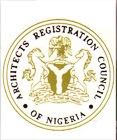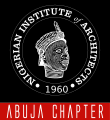Relevant Bodies

Nigerian Institute of Architects
The Nigerian Institute of Architects (NIA) was founded on the 1st of April 1960 as an association of independent professional architects with the aims and objectives of fostering friendships amongst members cater for their welfare and establish mutual support and cooperation amongst them.

The Architects Registration Council of Nigeria
The Architects Registration Council of Nigeria (ARCON) is the regulatory body established by the Architects (Registration, ETC,) Act Chapter A19, the Laws of the Federation of Nigeria 2004, to regulate the training of Architects and practice of Architecture in Nigeria.
To further strengthen the framework under which Architects practice in the country the ARCON Project Registration Number (APRN) is a mandatory registration number issued to all architects practicing in Nigeria, for each of their projects, to certify that these projects are being executed by Nigerian citizens, who are fully registered and financially current architects. Only fully registered and financially current architects and firms are eligible to prepare, produce and submit architectural building plan for approvals/ implementation- and to receive those approvals when they are given. Find more details on this REGISTRATION LINK.

The Association of Consulting Architects Nigerian
The Association of Consulting Architects Nigerian (ACAN) is the professional body that represents the Consulting Architects� Firms in private practice in Nigeria. It was registered as a company limited by guarantee with the Corporate Affairs Commission in 2003.

Federal Capital Development Authority
To oversee the Infrastructural and Physical Development (Planning, Design and Construction) of the new Federal Capital; ensuring that it conforms to and surpasses the standards of new Capital Cities around the world; also paying special attention to Inclusivity, Functionality, Design and Aesthetics.

The Department of Development Control is the organ of the FCT Administration that is saddled with the responsibility of monitoring and ensuring compliance with all development guidelines, largely, the Abuja Master Plan and the FCT Regional Development Plan as conceived by the founding fathers before 1979. The Development Control was a Division under the Department of Planning and Survey before it became a full-fledged Department of its own in 2002. Activities of Department of Development Control in the FCT have far reaching impact on the environment, health, safety and convenience of the people. While activities are painful and herculean to the people and officials respectively, they are nonetheless aimed at achieving the goals and aspirations of the founders of Abuja, the new Capital City of Nigeria, one within which people can live, work, recreate and interact with utmost ease.
The Federal Capital City and indeed the entire Territory have witnessed flagrant abuse and distortion of development policies and guidelines. The city has suffered unscrupulous land speculation activities, manifested through indiscriminate conversion of flood plains and green areas, unprecedented and spontaneous growth of slums and squalid settlements leading to the collapse of infrastructure and other essential services, as well as an extremely low urban environmental quality. There were also increased rate of traffic congestion, crime and haphazard development contrary to the aspirations of the founding fathers and concepts of the Master Plan for the new capital city. It is in this vein that the Federal Government in 2003 adopted the policy of the restoration of the Abuja Master Plan in its entirety.

Abuja Geographic Information Systems
The AGIS project includes the introduction of SDI (Spatial Data Infrastructure) for F.C.T, the computerization of spatially related workflows in selected FCDA departments and agencies and the build up of the AGIS Resource Centre.
